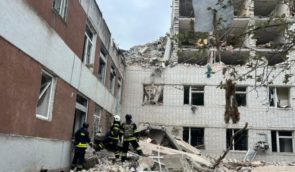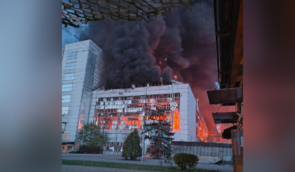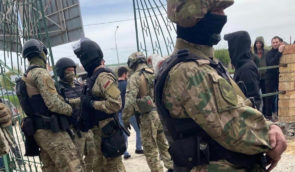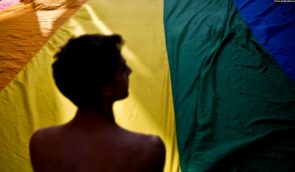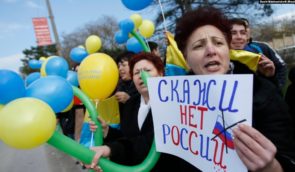37 cases of freedom of speech and expression violation happened in the second half of 2016 in Crimea – review

Human Rights Information Centre has recorded 37 cases of violation of freedom of speech and expression in the Russian-occupied Crimea in the second half of 2016.
Monitoring review, which was published in Russian and English languages, reveal the cases of freedom of speech and expression violation through assaults, physical violence, property damage, criminal and administrative persecution, including interrogations, searches, arrests, fines, restrictions on TV and radio broadcasting, internet media blocking, refusals of access to information, prohibitions of filming, dismissals, intimidation, censorship and other cases of suppression of journalists, bloggers, and other citizens who express their opinions publicly or spread information.
In the second half of 2016 a number of people have suffered from criminal prosecution: Larisa Kitayskaya, an activist from Yalta; Aleksiy Nazimov, the editor of Tvoya Gazeta newspaper, and his coworker a cameraman Andriy Oblezov; Suleiman Kadyrov, a Crimean Tatar activist, for alleged calls for non-recognition of the borders of the Russian Federation; a 24-year old member of Sevastopol ultras movement, whose name is kept undisclosed. The young man was sentenced to two years and two months of imprisonment (suspended sentence) for calls on the Internet to the liberation of Crimea from the Russian occupation by military means. Aleksiy Amelin, the director of the Grand Media LTD, and Crimean journalist Mykola Semena were prosecuted by the occupation authorities. Journalist was accused of separatism for publishing an article in the Krym.Realiyi publication.
One case of assault and physical violence, which happened in the July 2016, was in the focus of the monitoring. Galina Balakina, press secretary of the Crimea Independent Trade Unions Federation, together with the organization’s cameraman were invited to the KrymTrolleibus Company to examine the complaints of employees about the unreasonable firings and wage cuts. Representatives of the Federation were roughly pushed out of the room. Law enforcement officers of the occupied Crimea has not seen the violence in actions of attackers, albeit the fact that the attack was recorded on the video.
The administrative persecution chapter describes the arrest of a civil activist Oleksiy Shestakovich. Police has suspected him of drug use, and an activist himself connects the prosecution with his application for picket at the FSB office, planned for September 20. He was also accused of making stencil paintings with calls for boycott of the election in the Crimea.
The Zheleznodorozhnyi District Court of Simferopol imposed a fine of 1000 RUB for a post on Vkontakte social network, which he allegedly posted in 2010. The post contains video titled “The last video recording of Primorye partisans”, which is recognized as extremist in Russia.
The monitoring review reported about a search of the pro-Russian Crimean Tatar Millet TV channel and about the interrogation of Ragim Gumbatov, the editor of Alubica newspaper. Human Rights Information Centre also recorded two cases of threats, one case of seizures and one case of censorship.
Censorship was detected in the demand, made by the Roskomnadzor, to delete the article of the Novosti Sevastopolia publication, which said that several residents of one of the houses in the city declared expressed the readiness to resort to self-immolation. They were trying to oppose the attempts of illegal takeover of their apartments. The publication was accused of propaganda of suicide.
Blocking access to media resources chapter contains 10 cases. Krym.Realiyi, Sobytia Kryma, Meridian Sevastopol, Chernomorka, Obozrevatel, ATR channel, Hromadske Radio, Apostrophe, StopFake, BlackSeaNews and others were subjected to blocking.
In addition, human rights defenders have recorded five denials of access in the coverage of events and one filming prohibition.
As a reminder, in the November of last year, Ukrainian and international human rights defenders sent to the International Criminal Court in Hague, a report describing the evidence of international crimes in the occupied Crimea. The authors of the report wish to encourage the Court to initiate an investigation.

